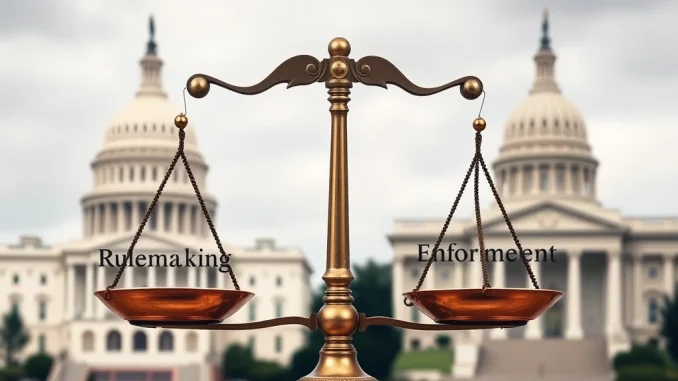
The landscape of crypto regulation US is constantly evolving, and a recent statement from a key figure within the U.S. Securities and Exchange Commission (SEC) has sparked significant discussion. For anyone navigating the digital asset space, understanding the path forward for SEC crypto policy is paramount. This is precisely why the comments from Paul Atkins SEC Commissioner, are particularly noteworthy.
According to a report by Cointelegraph, Commissioner Atkins emphasized that the development of SEC crypto policy should primarily occur through a transparent, public rulemaking process. This involves giving the public and the industry notice of proposed rules and allowing them to provide feedback before final regulations are enacted. This stands in contrast to setting policy primarily through SEC enforcement crypto actions.
Why is Rulemaking Preferred Over Enforcement for Crypto Regulation US?
The debate between developing policy via formal rulemaking versus setting precedents through enforcement actions is a long-standing one, particularly contentious in rapidly evolving sectors like cryptocurrency. Here’s a breakdown:
- **Public Rulemaking:** This is a structured process defined by the Administrative Procedure Act (APA). It typically involves:
- The agency (like the SEC) proposing a rule.
- Publishing the proposed rule for public notice and comment.
- Considering comments received.
- Issuing a final rule.
This process is designed to be transparent, allowing affected parties and the public to provide input and understand the basis for the rule.
- **Enforcement Actions:** This involves the agency investigating potential violations of existing laws and bringing legal action against individuals or companies. While enforcement is a necessary tool to police markets and punish bad actors, using it as the *primary* method to define what is or isn’t compliant in a new area can lead to uncertainty. Critics argue it amounts to ‘regulation by enforcement,’ where the rules of the road become clear only *after* someone has potentially broken them, based on the outcome of specific legal cases.
What Does Paul Atkins SEC Stance Signify?
Commissioner Atkins’ statement, highlighting the need for public rulemaking crypto policy, reflects a view held by many in the crypto industry and some policymakers. It suggests a desire for greater clarity and predictability from the regulator.
His position underscores a potential internal divergence or at least a specific perspective within the SEC on the best path forward for governing digital assets. As a Commissioner, Atkins is one of five appointed officials who lead the SEC, and his views carry weight in policy discussions.
The Impact of SEC Enforcement Crypto Actions on the Industry
While necessary for policing fraud and manipulation, a heavy reliance on SEC enforcement crypto actions without clear underlying rules can create significant challenges:
- **Uncertainty:** Businesses and innovators are unsure what activities are permissible, hindering investment and development.
- **High Costs:** Defending against enforcement actions is expensive and time-consuming.
- **Chilling Effect:** Fear of regulatory action can discourage legitimate innovation and participation in the market.
- **Inconsistency:** Policy can appear inconsistent as it’s developed case-by-case through litigation rather than through a holistic, prospective process.
This is why the call for public rulemaking crypto policy is seen by many as a positive step towards fostering a healthier, more predictable environment for digital assets in the U.S.
The Promise of Public Rulemaking Crypto Policy
Embracing a public rulemaking crypto approach offers several potential benefits for both the regulator and the regulated:
- **Clarity:** Provides clear, forward-looking rules that everyone can understand and follow.
- **Industry Input:** Allows the SEC to benefit from the technical expertise and practical experience of those operating within the crypto space.
- **Tailored Rules:** Enables the development of regulations specifically designed for the unique characteristics of digital assets, rather than trying to shoehorn them into existing frameworks designed for traditional finance.
- **Predictability:** Creates a more stable regulatory environment, encouraging long-term investment and innovation.
Achieving comprehensive crypto regulation US through rulemaking is a complex undertaking, requiring significant resources, expertise, and political will. However, proponents argue it’s essential for establishing a robust and fair regulatory framework that protects investors while allowing innovation to flourish.
Conclusion: A Call for a Clearer Path
Commissioner Paul Atkins’ statement is a significant call for the SEC crypto policy to be forged in the open, through dialogue and defined rules, rather than primarily through legal battles. As the debate around crypto regulation US continues, the emphasis on public rulemaking crypto policy represents a widely supported path toward achieving the much-needed clarity that the digital asset industry has been seeking. The future development of SEC crypto policy and whether it leans more towards transparent rulemaking or continued reliance on SEC enforcement crypto actions will be a critical factor shaping the crypto landscape in the United States.



